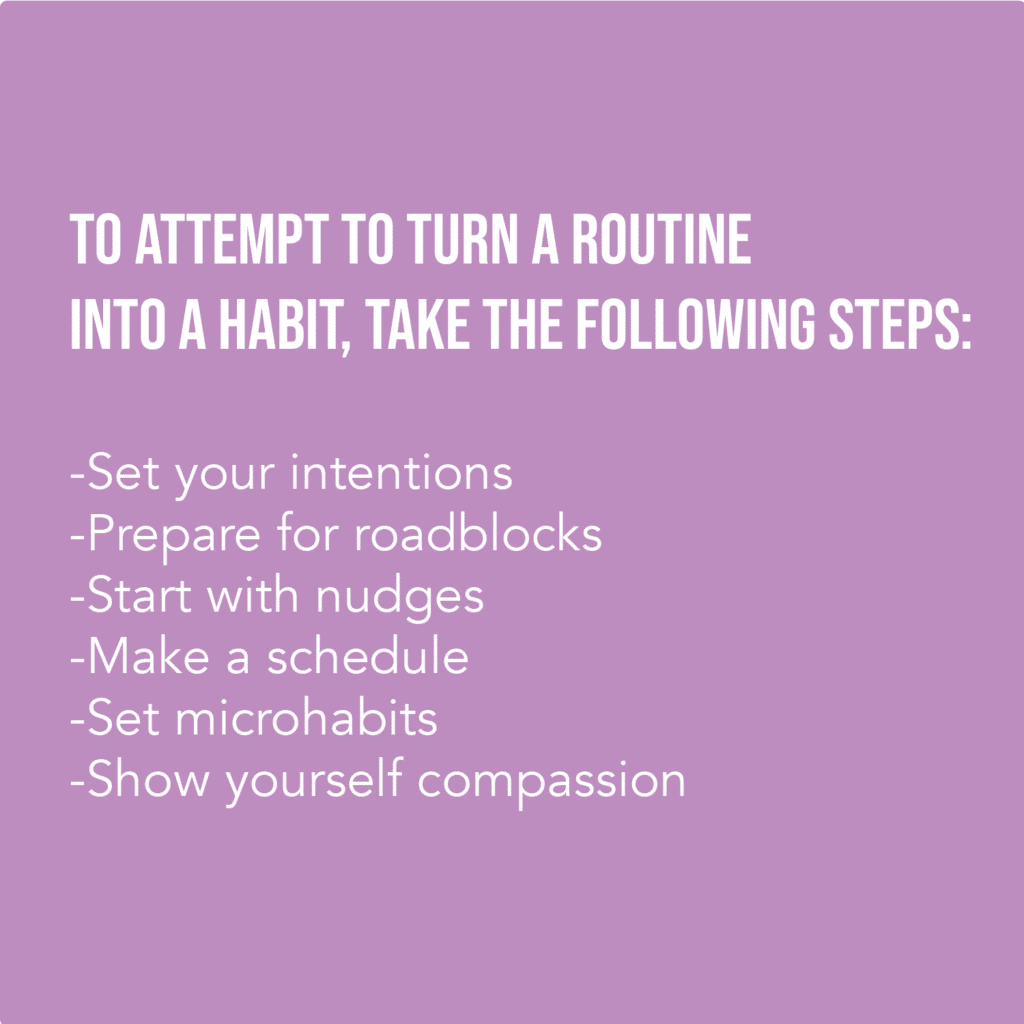What is a habit?
What you repeatedly do (i.e. what you spend time thinking about and doing each day) ultimately forms the person you are, the things you believe, and the personality that you portray.
Routines vs. Habits
Most of us assume the two are interchangeable. But Nir Eyal, author of Indistractable: How to Control Your Attention and Choose Your Life, stated that this is a common fallacy — one that tends to end in disappointment. “When we fail at forming new patterns of behavior, we often blame ourselves,” he said, “rather than the bad advice we read from someone who doesn’t really understand what can and cannot be a habit.”
Eyal explained that a habit is a behavior done with little or no thought, while a routine involves a series of behaviors frequently, and intentionally, repeated. A behavior has to be a regularly performed routine before it can become a habit at all.
The problem is that many of us try to skip the “routine” phase. According to Eyal, this is because we think that habits will allow us to put tedious or unenjoyable tasks on autopilot. (Your to-do list would be so much better if it just conquered itself, somehow.)
Unlike habits, routines are uncomfortable and require a concerted effort. Waking up early to run every morning or meditating for 10 minutes every night, for instance, are rituals that — initially — are hard to keep up. Habits, on the other hand, are so ingrained in our daily lives that it feels strange not to do them. Imagine not brushing your teeth before bed or not drinking a cup of coffee with breakfast. If these are habits you have already formed, avoiding them might even feel bad.
What is a neural pathway?
In brief, a neural pathway is a series of connected neurons that send signals from one part of the brain to another.
Neurons come in three main types: motor neurons that control muscles; sensory neurons that are stimulated by our senses; and inter-neurons that connect neurons together. These connected neurons process the information we receive. It is these that enable us to interact, as well as experience emotions and sensations. They create our memories and enable us to learn.
We already have a series of neural pathways, and we are creating new ones all the time. An example of an early neural pathway is that if a baby smiles, he or she is rewarded by a smile in return and possibly a cuddle. The same baby may work out that if he or she touches something sharp, it may hurt. Both are valuable learning experiences.
Neural pathways are essential; however not all of them are beneficial and can become negative habits.
How neural pathways develop
Like a physical pathway on the ground, if you keep going over the same route, it becomes a habit. You probably have a set route that you take on the way to the local shop. You can walk it with your eyes closed, and why would you ever go a different way when this way is so ingrained?
Habits are the same. By always reaching for a bar of chocolate when you feel low, or a drink to lessen feelings of anxiety, you are creating a pathway in the brain. This means that like your walk to the shop, you automatically follow the same route. You’re feeling down, so your brain goes along the path to the chocolate bar.
The happy thing is that like a real road system, the brain can be changed and adapted. This flexibility of the brain is called neuroplasticity, and it’s this that enables you to change habits that you thought were ingrained. Like the Highways Agency, the brain can create new routes and shut off old ones, with some help and training.
How can I maintain a habit?
Some people may consider the hard part over once you’ve set the new habit in place. But what about keeping it there? Here are five steps you can do to help maintain your habit:
1) Choose your habit wisely
The first step in creating a healthy new habit that will be a long-term staple in your lifestyle is to choose an activity that fits well with who you are and how you live. If you don’t, you may find that you’re working against personality and lifestyle factors that are too ingrained to change, and your new healthy habit never quite takes root.
2) Build the new habit into your pre-existing schedule
If you don’t have a specific plan for sticking with a new habit, it’s all too easy to find that your already-packed schedule won’t allow you the ‘spare time’ necessary to do anything new very often. You’ll be too busy, too tired, or will easily find another excuse to let inertia snuff out your best intentions. That’s why a crucial next step is for you to find a specific time in your schedule that’s allotted just for your new stress management activity.
3) Enlist support to keep you on the path you want
You’ll find much more success if you have others who are helping you along the way. Not only will they give you support when you need it, but you’ll also have them to answer to if you feel like skipping your new stress management practice, and this will make it harder for you to make excuses and quit.
4) Utilize goals and rewards for the new habit
Although the great feelings you get from stress management can be their own reward, in starting any new habit, it helps to also have some more tangible rewards. For example, think of how teachers use stars and other tokens to encourage good behavior, or how you can train pets to do just about anything with a few small treats; none of us is above the power of a few good rewards, either.
5) Check in with yourself to ensure you’re on the right track
As you move toward developing healthier habits, pay special attention to how you feel as you incorporate them into your life. Does your new practice seem to fit with your lifestyle and personality? Is it easy to maintain your new habit, or do you think you may need to try something new?
If you find that you haven’t kept up with your new plans as you’ve hoped, rather than beating yourself up over it, congratulate yourself for noticing that you need to change or modify your plans—this is very important as it’s the first step in building a new plan that will better serve you! And, if you’re trudging along with it, but have decided that you really may need to try something else instead, at least you know what doesn’t work for you as well, and now you can try something else that you may end up loving.
Ultimately, you always have the opportunity to grow and change. If a new habit that you’ve set into place doesn’t fit like you hoped it would, show yourself compassion and start a new one! Growth and change only happen when you’re willing to let yourself fail to eventually succeed. If you find that you’re still struggling with creating new healthy habits, contact our admissions team here at New Roads Behavioral Health to start on your treatment journey. Our entire team is here to cheer you on!


